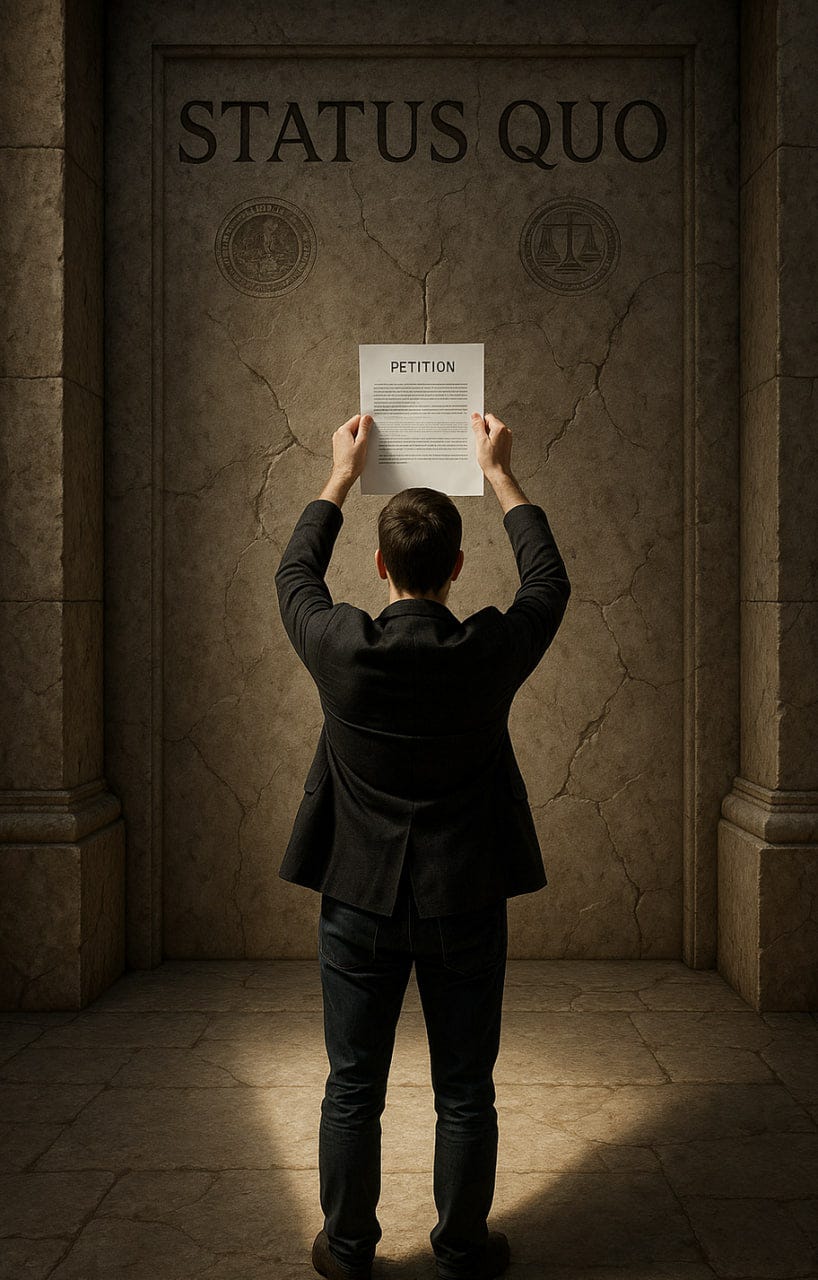On the face of it, our recent petition was simple:
That those councillors who are promoting large-scale development should be required to offer their own private land and property assets before disposing of public assets or imposing compulsory purchase on private property.
It is common sense. It is fair.
And so far, it has received just nine signatures.
Some might look at that number and call it a failure. But it was never meant to be a popularity contest. It was a demonstration, a clear example of how broken the culture of public accountability has become.
What the Petition Actually Meant
We did not file this petition expecting the authorities to adopt it. We understood perfectly well that councils and their advisers would ignore it, just as they ignore any proposal that disrupts their predetermined plans.
The purpose was threefold:
To expose the hypocrisy:
Many councillors insist they must seize public assets and force private owners to give up their property because there is supposedly “no alternative.” Yet public assets—parks, buildings, community land, already belong to the people they serve. And the councillors demanding these sacrifices never propose offering their own private gardens, their own land, or their own investments to meet the targets they claim are so urgent.
Our Freedom of Information requests have confirmed that, in many areas, councils cannot even produce data to prove any genuine housing emergency exists. No audited records, no transparent evidence, no consistent figures—just broad statements and declarations. The same pattern appears in FOI replies about so-called “climate emergency” projects, which directly affect land use and private property rights but are justified without robust evidence. When a crisis cannot be demonstrated with facts, it is not a crisis at all, it is an ideological desire masquerading as necessity.
To force the contradiction into the open:
If you have the choice between contributing your own resources or dispossessing others, and you choose the latter every time, you are not acting in the public interest—you are advancing an agenda.
To trigger reflection:
We wanted ordinary people, residents, councillors, community campaigners, to ask the obvious question:
Why is no one in authority even considering the simplest, fairest option?
Why Only 9 Signatures?
It would be easy to interpret the low number as proof no one cared, or that the issue was too niche. But the real explanation is far more revealing—and far more disturbing.
People have been subjected to years of psychological conditioning:
Constantly told that everything is too complex for them to understand.
Taught that resistance is futile.
Bombarded with jargon and procedural fog.
Left demoralised by consultations that pretend to listen but never change anything.
The result is a public so exhausted and disoriented that they no longer trust their own instincts about right and wrong.
They know it is wrong to strip communities of assets they paid for.
They know it is wrong to pretend there is “no alternative” when alternatives exist.
But they have been conditioned to believe that stating the obvious achieves nothing.
This is not an accident.
This is the ground-clearing that every top-down restructuring relies on:
Wear people down so thoroughly that they stop objecting out loud.
What We Learned
This experience confirmed what we have seen again and again:
The machinery of reorganisation is not defeated by moral clarity alone.
Common sense must be paired with procedural leverage and persistent exposure of contradictions.
Most importantly, the opposition must be willing to dismantle the engine itself, not just protest its outcomes.
Our aim should never be limited to winning a single policy change. It must be to rebuild people’s capacity to recognise:
What is right.
What is wrong.
And how straightforward principles are systematically buried under layers of manufactured complexity.
A Final Thought
The establishment does not fear opposition that plays by its rules.
It fears the moment people realise that those rules were designed to exhaust them into compliance.
This petition was never about signatures.
It was about refusing to pretend that dispossession is inevitable.
It was about proving that common sense still exists and that even in small numbers, it can be stated clearly and without apology.
If we do not dismantle the machinery, it will dismantle us—one principle at a time.





Amazing